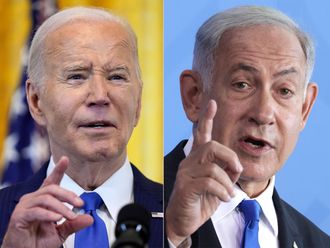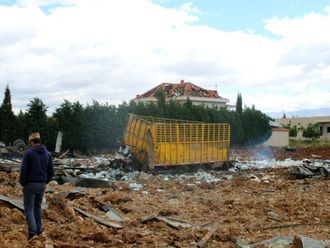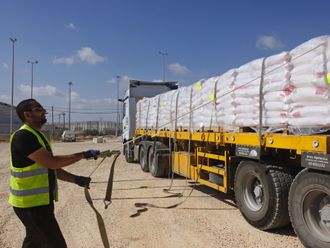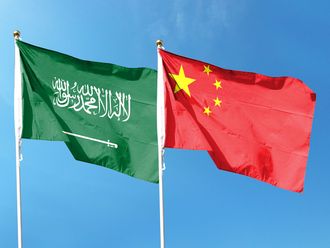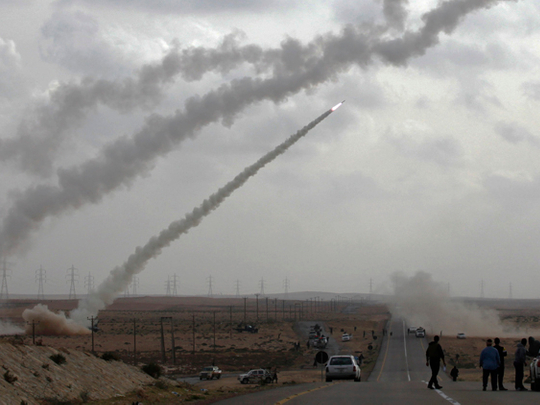
Tripoli: Nato on Thursday dismissed Libyan claims that Britain had struck the North African country's largest oil field, blaming Muammar Gaddafi's forces for the attacks that halted production.
The eastern Sarir and Messla fields came under fire just as the rebels had sold their first oil cargo in weeks.
The Equator, a Liberian-flagged tanker that can transport up to 1 million barrels of oil, left the eastern port of Tobruk late Wednesday en route to Singapore, oil and shipping officials said.
The shipment - the first since Qatar said it would market their oil - marks a milestone for the officials in Benghazi who have been steadily courting the international community in a bid to win firmer backing in their fight against Gaddafi.
Their hopes for continued exports, at least in the short-term, were dealt a blow after the attacks on the 12 billion barrel Sarir field, the country's largest, and the 3 billion barrel Messla field, forced a halt in production. The rebels blamed Gaddafi's supporters, citing three days of attacks on the opposition-held fields.
Libya denied the allegation. Deputy Foreign Minister Khaled Kaim told reporters late Wednesday that "British war planes" struck Sarir, killing three guards and wounding other workers while also damaging field equipment and an oil pipeline. He did not say how many workers were wounded. He also did not say why he specified Britain, which is part of the Nato air campaign.
"It is aggression against the infrastructure of (the) oil industry in Libya," said Kaim, adding that "all oil facilities in Libya are secured by guards ... and they are quasi-military, like private companies."
"They are armed lightly," he said. "Our forces didn't attack any oil fields."
Nato said it had been monitoring the Sarir oil fields over the past week and that attacks by pro-Gaddafi forces had resulted in a number of skirmishes and at least one fire at an oil facility.
"We are aware that pro-Gaddafi forces have attacked this area in recent days," said Canadian Lt. Gen. Charles Bouchard, who commands the allied operation. "To try and blame it on Nato shows how desperate this regime is."
Bouchard said in a statement released Thursday that alliance warplanes had not bombed the region because Gaddafi's forces were not threatening any civilian population centre there.
Earlier Wednesday, rebel spokesman Abdul-Hafidh Goga said armoured vehicles attacked Messla on Monday and Tuesday, and then, on Wednesday, struck Sarir. The two fields are in the massive Sirte Basin region, which holds roughly 80 per cent of Libya's 46.4 billion in proven reserves of conventional crude oil.
The extent of the damage to the fields was not immediately clear, but Goga said the rebels would not be able to sustain the 100,000 barrels per day they had been producing for the past few weeks. He said the rebels have about 1 million barrels in storage.
That output was a fraction of Libya's pre-crisis production of around 1.6 million barrels per day, and the disruption in supply has panicked international oil markets, pushing the London-based Brent futures contract to roughly $122 per barrel while the U.S. benchmark crude futures contract was hovering near $109 per barrel early Thursday.
Qatar has agreed to help market Libya's oil, with the funds most likely to be placed in an escrow account, according to analysts. The profits would be used to buy food, medicine and other supplies. But it was unclear if the Gulf nation had played a role in the oil shipment that left Tobruk on Wednesday.
An Arabian Gulf-based industry executive said it was doubtful that Qatar had played a role, noting that the deal was "done with a European trader." Other oil officials said earlier that the cargo was picked up by Geneva-based oil trader Vitol SA.
Michelle Wiese Bockmann, markets editor for the shipping publication Lloyd's List in London, said satellite data make clear the tanker was loaded while in Tobruk. She said it is headed for Singapore, a destination that the Gulf-based industry executive also confirmed.
"There is so much cloak and daggers surrounding this shipment, it's unbelievable," she said.
For example, the shipping rate hasn't been disclosed, and at least two separate "fixtures" - which provide details of the shipment - have been circulated, she said. One incorrect fixture indicated the Equator wouldn't be sailing until April 21.
"There are extreme commercial sensitivities attached to this shipment," she said. "The tanker owner won't confirm the shipment. Vitol won't confirm the shipment."
The Gulf-based oil executive said the oil may either be processed in a refinery in Singapore, or may be taken to China.
He said that the Qataris were positioned to help the rebels place their oil in Asia, a region where Qatar has more experience. But with most Libyan crude typically placed in Europe, "the Qataris have no exposure to the European market, so I'm not sure what they're bringing to the table."
Qatari oil officials have repeatedly declined comment.
Kaim, the deputy foreign minister, said that "Qatari elements were controlling the port in Tobruk" as part of a deal with the rebels and the Gulf state's government. The claim could not be substantiated, but Qatar has agreed to market oil from the rebel-held east, in a deal that would give the Benghazi-based officials access to some sorely needed cash.
Wiese Bockmann said the fact that a tanker was able to get in to Libya and load the oil was important.
"It's quite significant because it shows that if you can find a buyer for your oil, there's a tanker that's prepared to ship it," she said.


